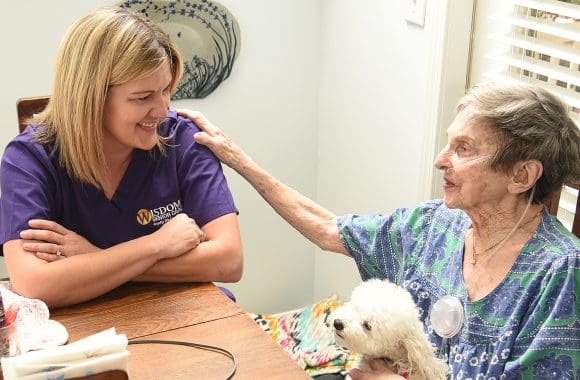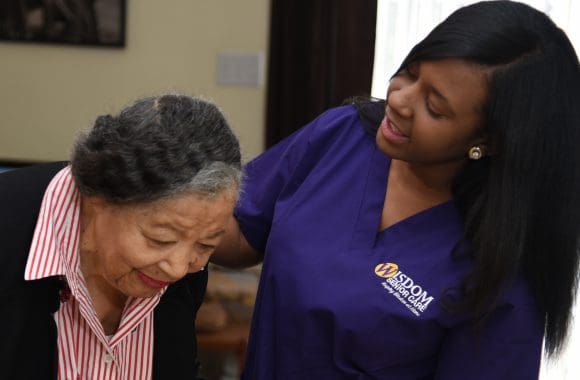
Our primary goal is to bring "Peace of Mind" when answering your senior in home care concerns.
(800) 280-3758
Email: info@wisdomseniorcare.com
Wisdom Senior Care
6739 Falls of Neuse Road, Raleigh, NC 27615
COMPANIONSHIP SERVICES
- Provide respite care
- Monitor diet and eating
- Stimulate mental awareness
- Companionship and conversation
- Supervise home maintenance
- Prepare grocery lists
- Mail bills and letters
- Plan visits, outings, and trips
- Assist with entertaining
- Answer the door and phone
- Maintain calendar
- Check food expirations
- Reminisce about the past
- Reminders for appointments
- Care for houseplants
- Oversee home deliveries
- Assist with clothing selections
- Discuss current events
- Discuss historical events
- Play games and cards
- Record and arrange recipes
- Clip coupons for shopping
- Monitor TV usage
- Buy magazines, papers, and books
- Rent and play movies
- Visit neighbors and friends
- Read religious material
- Maintain family scrapbook
- Record family history
- Pet Walking
HOME MANAGEMENT SERVICES
- Provide Alzheimer care
- Provide Dementia care
- Aid with morning wake-up
- Assist with pm care (tuck-in)
- 24-hour services
- Arrange appointments
- Provide medication reminders
- Aid with reading
- Assist with ambulation (walking)
- Organize mail
- Personal Care Needs
- Geriatric care management
- Change linens and make beds
- Write letters and correspondence
- Plan, prepare and clean up meals
- Escort for shopping
- Escort for errands
- Escort for appointments
- Drop off and pick up dry cleaning
- Pick up prescriptions
- Organize and clean closets
- Assist with pet care
- Shop for groceries and supplies
- Prepare future meals
- Accompany to lunch or dinner
- Dusting vacuuming and sweeping
PERSONAL CARE SERVICES
- Eating
- Grooming
- Dressing
- Bathing
- Incontinence care/toileting
- Cognitive impairments
- Mobility
- Medication reminders
- Appointments Arrangements
TRANSPORTATION SERVICES
- Driver Needs
- Shopping Transportation
- SPA Transportation
- Transportation To SPA appointment
- Transportation for Pet grooming
- Transportation to Pet day camp
- Transportation To medical appointment
- Transportation to Lunch or dinner
- Transportation To religious services
- Transportation to plays and Concerts
- Transportation to meeting and sporting events
What are IADLs? Instrumental Activities of Daily Living:
Managing Finances
Driving
Managing medication
Doing housework
Preparing meals
Shopping
What are ADLs? Six Activities of Daily Living are:
Dressing
Toileting
Eating
Bathing
Continence
Transferring
Why is Home Care Important?
A Wisdom Senior Care Network Study Found
That an overwhelming number of seniors, about 86% of them, want to continue living in their homes for as long as they can and seniors appear to be more willing to look for help for them to do this. The study also found that 54% of all seniors who live alone are more likely (about four times more likely) to seek professional care solutions than seniors living with their children. Interestingly, paid care users tend to be older individuals, with 42% of pensioners over 80 years of age relying on professionals.
Senior care professionals and family caregivers may notice some changes in the loved ones they are caring for, and this tends to raise red flags that indicate that an otherwise healthy senior needs more professional assistance for him or her to live independently and safely at home. When you see such signs, it is an indication that you probably should be considering calling for help:
Seniors start getting overwhelmed by simple tasks like reading and responding to mail.
Many seniors having trouble with functions like hearing, remembering and walking prefer pulling away from the community and going into isolation rather than seek help.
Older People who suddenly find themselves all alone, perhaps after a spouse has died can easily get discouraged by task such as cooking and have a tendency of not eating properly.
Changes in appearance, such as untidiness, body odor, unkempt hair, clothing inappropriately for the weather, or failing to change clothes for long periods on end, are amongst some of the more obvious signs that a senior is in need of assistance.
Another sign to look out for is a decline in driving skills. Look for things that could suggest this, such as dents and scratches on the car, accidents, speeding or parking tickets.
Utensils and cooking ware that have been forgotten on top of open burners until they become scorched could be a sign that a senior is suffering from short-term memory loss or Alzheimer’s disease.
Fewer visits with family and friends, listlessness, feeling of despair and hopelessness, a lack of interest in activities and hobbies they like, and changes in sleeping patterns could be indicators that a senior is suffering from depression and needs professional care.
Such could be signs of forgetfulness or depression. However, they also could be because the senior no longer has a driver’s license and does not know of any other way to get where they want to go.
A change in housekeeping practices may be because the individual is physically tired. However, it could also be because they are depressed.
Pensioners are often prescribed multiple medications for various conditions that affect their health. Keeping track of when to take medication and which medication to take without assistance and reminders can become quite confusing for them.
 27 June 2019 by Chris Mcmullan, in ALZHEIMER,CAREGIVERS,DEMENTIA,IN HOME CARE
27 June 2019 by Chris Mcmullan, in ALZHEIMER,CAREGIVERS,DEMENTIA,IN HOME CAREHELPING SENIORS CREATE AN EMERGENCY CONTACT PLAN
...READ MORE + 26 April 2019 by Chris Mcmullan, in ALZHEIMER,CAREGIVERS,DEMENTIA,IN HOME CARE
26 April 2019 by Chris Mcmullan, in ALZHEIMER,CAREGIVERS,DEMENTIA,IN HOME CAREWHAT SENIORS NEED TO KNOW ABOUT OSTEOPOROSIS
...READ MORE +

 26 April 2019 by Chris Mcmullan, in ALZHEIMER,CAREGIVERS,DEMENTIA,IN HOME CARE
26 April 2019 by Chris Mcmullan, in ALZHEIMER,CAREGIVERS,DEMENTIA,IN HOME CARECELEBRATE NATIONAL WOMEN’S HEALTH MONTH
...READ MORE +




